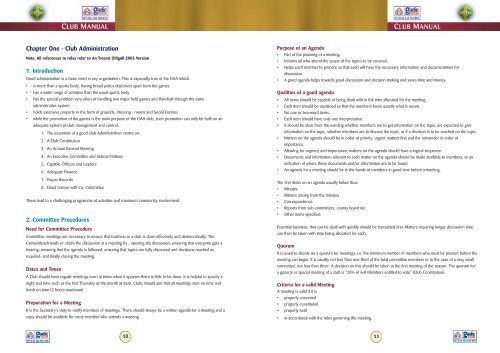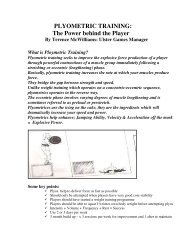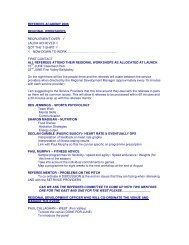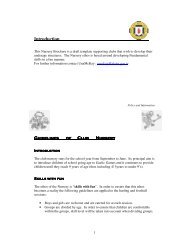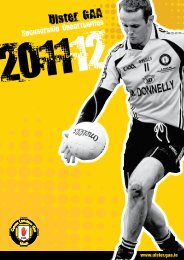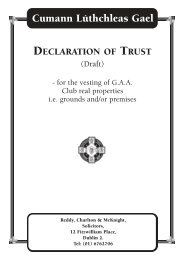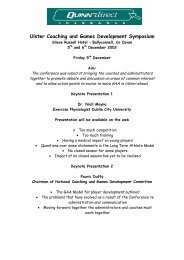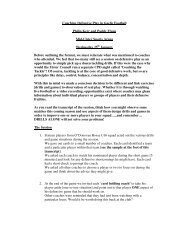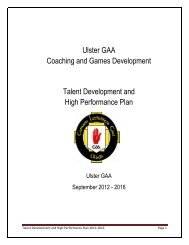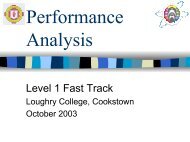Club Manual - Ulster GAA
Club Manual - Ulster GAA
Club Manual - Ulster GAA
You also want an ePaper? Increase the reach of your titles
YUMPU automatically turns print PDFs into web optimized ePapers that Google loves.
Chapter One - <strong>Club</strong> Administration<br />
Note: All references to rules refer to An Treorai Oifigúil 2003 Version<br />
1. Introduction<br />
Good administration is a basic need in any organisation. This is especially true of the <strong>GAA</strong> which<br />
• is more than a sports body, having broad policy objectives apart from the games<br />
• has a wider range of activities than the usual sports body<br />
• has the special problem very often of handling two major field games and Handball through the same<br />
administrative system<br />
• holds extensive property in the form of grounds, dressing - rooms and Social Centres<br />
• while the promotion of the games is the main purpose of the <strong>GAA</strong> club, such promotion can only be built on an<br />
adequate system of club management and control.<br />
1. The essentials of a good club Administration centre on:<br />
2. A <strong>Club</strong> Constitution<br />
3. An Annual General Meeting<br />
4. An Executive Committee and Subcommittees<br />
5. Capable Officers and Leaders<br />
6. Adequate Finance<br />
7. Proper Records<br />
8. Good Liaison with Co. Committee<br />
These lead to a challenging programme of activities and maximum community involvement.<br />
2. Committee Procedures<br />
Need for Committee Procedure<br />
Committee meetings are necessary to ensure that business in a club is done effectively and democratically. The<br />
Cathaoirleach leads or chairs the discussion at a meeting by : opening the discussion; ensuring that everyone gets a<br />
hearing; ensuring that the agenda is followed; ensuring that topics are fully discussed and decisions reached as<br />
required; and finally closing the meeting.<br />
Dates and Times<br />
A <strong>Club</strong> should have regular meetings even at times when it appears there is little to be done. It is helpful to specify a<br />
night and time such as the first Thursday of the month at 8pm. <strong>Club</strong>s should aim that all meetings start on time and<br />
finish on time (2 hours maximum)<br />
Preparation for a Meeting<br />
It is the Secretary's duty to notify members of meetings. There should always be a written agenda for a meeting and a<br />
copy should be available for every member who attends a meeting.<br />
Purpose of an Agenda<br />
• Part of the planning of a meeting.<br />
• Informs all who attend the scope of the topics to be covered.<br />
• Helps each member to prepare so that each will have the necessary information and documentation for<br />
discussion.<br />
• A good agenda helps towards good discussion and decision making and saves time and money.<br />
Qualities of a good agenda<br />
• All items should be capable of being dealt with in the time allocated for the meeting.<br />
• Each item should be explained so that the members know exactly what is meant.<br />
• No one or two-word items.<br />
• Each item should have only one interpretation.<br />
• it should be clear from the wording whether members are to get information on the topic, are expected to give<br />
information on the topic, whether members are to discuss the topic, or if a decision is to be reached on the topic.<br />
• Matters on the agenda should be in order of priority, urgent matters first and the remainder in order of<br />
importance.<br />
• Allowing for urgency and importance, matters on the agenda should have a logical sequence.<br />
• Documents and information relevant to each matter on the agenda should be made available to members, or an<br />
indication of where these documents and/or information are to be found.<br />
• An agenda for a meeting should be in the hands of members in good time before a meeting.<br />
The first items on an agenda usually follow thus:<br />
• Minutes<br />
• Matters arising from the minutes<br />
• Correspondence<br />
• Reports from sub-committees, county board etc.<br />
• Other items specified.<br />
Essential business, that can be dealt with quickly should be transacted first. Matters requiring longer discussion time<br />
can then be taken with time being allocated for each.<br />
Quorum<br />
It is usual to decide on a quorum for meetings, i.e. the minimum number of members who must be present before the<br />
meeting can begin. It is usually not less than one-third of the total committee members or in the case of a very small<br />
committee, not less than three. A decision on this should be taken at the first meeting of the season. The quorum for<br />
a general or special meeting of a club is "20% of Full Members entitled to vote" (<strong>Club</strong> Constitution).<br />
Criteria for a valid Meeting<br />
A meeting is valid if it is<br />
• properly convened<br />
• properly constituted<br />
• properly held<br />
• in accordance with the rules governing the meeting.<br />
10<br />
11


